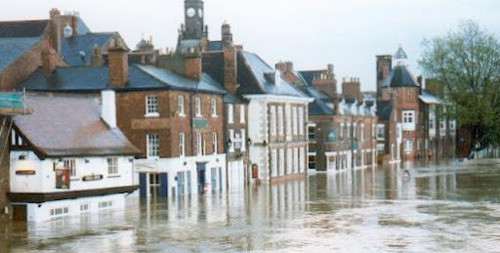
So yesterday Otto Thoresen, the new Director General of the Association of British Insurers (ABI), gave a speech at the Insurance Institute of London in which he set out five key priorities for UK insurers in 2012.
First on the list was flooding, “the biggest catastrophic risk facing the UK”.

This is what Mr Thoresen said, based on the prepared version of his speech:
Our current flooding levels are set to become both more frequent and severe as the effects of climate change take hold.
Excepting a few wingnuts we pretty much have a consensus on that, and the Climate Change Risk Assessment released by DeFRA yesterday certainly underlined that flooding is the UK’s greatest climate change threat.
We all remember the terrible 2007 floods which cost £3 billion.
What you may not be aware of is that during the 2007 floods there was almost a much more devastating situation, when a North Sea surge of water came within millimeters of over-topping the East Coast flood defences.
That was in November 2007, so not really connected to the flood events we all remember from June and July 2007. Still, technically true if by “within millimeters” he means within hundreds of millimeters. The defences really weren’t that close to over-topping. There was some concern that a storm surge similar to that in 1953 might develop, but in the end it didn’t.
This happened once before, in 1953, killing hundreds with devastating effects.
Yes, although we have the Thames Barrier and other defences these days. Based on a RMS study a similar event today would cause serious damage but we would not expect loss of life on the same scale. (Personally I’d be more concerned about a storm surge in the Bristol Channel or the Firth of Forth, which compared to estuaries on the East Coast are relatively undefended.)
We absolutely must make sure we obtain a satisfactory way forward with the Government on the coverage of flood insurance.
The current agreement with the Government, the Statement of Principles, expires in mid-2013.
This agreement was a temporary ‘sticking plaster’ when implemented.
It results in a distortion of the market which cannot be sustained.
OK. Kind of a philosophical point, depending on whether you want to advance the financial interests of insurers or consumers. However insurers are entitled to let the agreement expire and we’ve all had plenty of time to get used to the idea.
We want to see a free market with a support model financed through general taxation, and with Government as insurer of last resort - as happens across the world.
This is where he lost me. How is that a “free market” exactly? Is there such a thing as a state-backed free market? Is it just me or has the ABI’s grasp of economic theory gone a bit wibbly?
No other country in the world operates a free market which does not have some form of government intervention for people living in flood prone areas.
It’s true that the UK is very unusual in having a private market for household flood insurance. Also true that in most countries flood cover is usually provided by government-backed schemes.
What you don’t find is the two together.
There are no countries where the state acts as insurer of last resort but at the same time leaves insurers alone to make their own decisions on risk selection and pricing, which is presumably what the ABI means by a “free market”. Government intervention means the state controls pricing and cover levels, at least to the extent necessary to ensure the scheme remains solvent over the long term.
The ABI knows that there are no flood insurance models in other countries that are both (a) entirely palatable to its member insurers and (b) economically viable for the levels of accumulated flood risk we face in the UK. It knows this because it hired economics consultancy Oxera to study and report on that very issue.
What the ABI seems to want is an approach under which insurers can off-load loss potential from large flood events to the Government, i.e. the taxpayer, and simply continue underwriting household flood insurance at a reduced level of risk without any obligation to share the profits. That’s what “a support model financed through general taxation” means in practice.
I hope this is just a negotiating position. If the Government does relent and considers some kind of subsidy it should at least be in the form of a levy on all insurance policies or an increase in Insurance Premium Tax (IPT). However given how inert DeFRA and the Treasury have been over the past year it’s difficult to judge how well they really understand the issue.
Still, the ABI isn’t helping its reputation by taking such an extreme stance. It gives Government the opportunity to portray it as inflexible in the eyes of consumers.
In practice the private market for flood insurance is already subsidised by Government. Flood defences, which reduce insured losses, are almost entirely funded from general taxation or local levies. The Environment Agency also provides most of the mapping and other data that insurers use to evaluate flood risk.
It also helps to understand flood risk in the context of the industry’s wider arrangements with Government. In the UK the state already acts as insurer of last resort for terrorism risk (though the Pool Re scheme) and provides indemnity against damage from riots (under the Riot Damages Act). Insurers can hardly pretend they are taking on the majority of the risk from serious and catastrophic events.
Background? For the latest Government view see this DeFRA report from last month and the ABI’s response. There’s supposed to be a policy announcement in the spring.